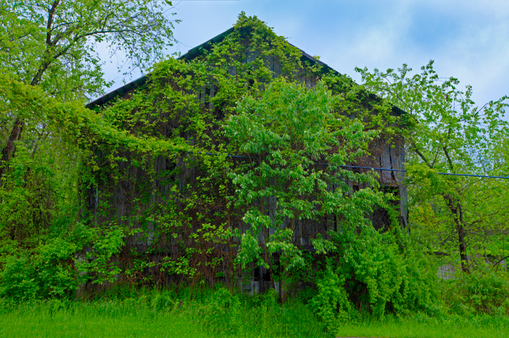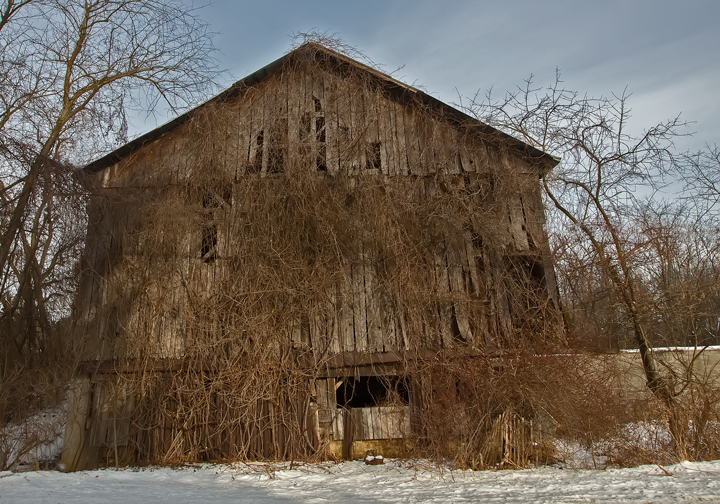
When we look upon the natural world in Winter we can easily conclude that a plant or tree is dead, when it is really dormant, and not dead in the least. Much of nature has drawn her life giving fluids into her place of origin, beyond our sight, into the soil, beneath the freeze zone, hidden in darkness.
We humans, however, fight against this drawing inward, this slowing down. We rebel when the weather becomes “unsettled.” We fret… maybe the salt trunks… the snow plows, the de-icer for planes… won’t clear a path for us fast enough. So we leave earlier, drive faster, take more risks.
We defy the natural rhythm of the Winter season. If the weather makes us slow down, the dominant culture takes a moral stance and names it “bad,” when it is simply a natural rhythm of the seasons of the Earth.
What if we can consider the gifts that Winter offers all the creatures of the Earth including the species called human? What are the gifts of Winter?
- If we are Amish we would have just completed an exhausting season of harvesting, canning, storing, cutting and splitting wood, and going to auctions and to markets to sell our produce. Winter offers the gift of dramatically slowing down, resting, reading, napping, weaving, carving, conversation with our family in our home, a day or more to visit with relatives and neighbors.
The slow pace is the opposite of the long days and hard work of summer and fall. This is a way of living, following the Earth’s natural rhythms.
Winter… dead? No, but dormant, resting, withdrawing inward to use less personal energy. - Another gift of Winter: Seeing deeper into the places of origin, seeing farther into the center, seeing the roots of life itself.
Seeing with greater clarity is a gift of winter, because as the trees let go of their leaves so we can see farther into the woods, than at any other time of the year.
As the winter winds blow away the ground cover of leaves at the base of trees, we see with greater clarity the roots of the trees, the only visible signs that lead to the center of life for the tree, her origins, her heart.
A gift of winter is to see our own roots, and in the slower pace of life, to follow our roots into our center, to the origins of our life, our heart.
Dead? No, dormant, resting, looking with greater clarity.
We might wonder, what has lain dormant in my life for decades which used to bring me alive? Maybe this is the winter we bring those dormant places of our life alive again? - Waging war against the cold and snow of winter is what the larger culture does. Or, we could surrender as they do in the Upper Peninsula of Michigan. We buy sweaters and gloves, boots and warm hats, and that thermal coat so we can walk comfortably outside in the woods in winter. We enter the season of Winter, rather than fight it.
When you do this, you will hear a world of sounds that you will not hear in any other season. You will hear voices speaking to you, you will not recognize except in winter.
The snow has its own language. The primary word is “crunch” with its infinite number of dialects.
When wood is stacked it speaks a new language. Rather than the “thud” wood says in other seasons, in winter wood expresses the middle “C” this way: a high pitched “chink,” following by 10,000 dialects.
The trees do not rub each other with an aching sound of arthritis. Their drum sticks sing a “clink,” the piccolo plays a high pitched “creak,” the bassoon sings an elongated sluuurr, the bird songs fly for miles and miles, all with 10,000 dialects.
The water in the streams all sing two octaves higher and slower, at 72 beats a second, the speed of your heart.
If you refrain from “power walking” but saunter (see Thoreau’s essay called Walking when he explains how to saunter), deer, squirrels, and countless other creatures who are moving much slower now, will pause and look you over from head to toe. Humans sauntering in the woods in winter are a rare sight for a deer, which you generously give them.
This is the significant way for you to participate in the Earth Community, which has been flourishing in the winter for 65 million years before humans appeared on the scene. Given the longevity before we even showed up, perhaps we might take notice.
It is just as important for them to know us, as it is for us to know them.
Without their realizing it, we have been taking from the Earth, but not putting back, except that which degrades, even eliminates their habitat with toxins we humans have created. And since this is their experience, being part of the Earth Community and not separate from it, this is also what we are doing to ourselves. We are destroying our own habitat as well as everyone else’s.
Winter. Dead? No, dormant, withdrawing into its center, inviting us to do the same, to live following the natural rhythms of nature, and discover a world around us and within us, that we do not know, if we follow the frenetic pace the culture insists we cannot live without.
But what if you did slow down and lived as fully as possible in this present moment. This is my favorite winter slogan: “Don’t do today, what you can put off until tomorrow.” - Another gift of Winter: We can become more attentive and patient to each other’s deepest need. Parker Palmer suffered from long periods of depression. “Friends” came by to fix him with their advice, but did not stay and sit with him, to be attentive and present. They dropped their “pearls of wisdom” and then quickly left, when he didn’t snap out of it.
But one true friend quietly made a habit of coming to Parker’s home after work. He walked into Parker’s bedroom with a large bowl of warm water and a towel. He asked if he might massage Parker’s feet. Silently, slowly, deliberately, he massaged his feet, and took his time to dry Parker’s feet. And then he quietly left, saying “I’d like to come tomorrow, if that would be alright.”
This quiet gift continued for months. Much later Parker said that this gift and this gift alone, kept him connected. And although his depression drew him back after the massage ended, still the time he felt connected to other humans grew in length and depth. He made his way back from that place of being immobilized. His friend was present in silence, and in that silence, massaging Parker’s feet is the gift the friend was led to give.
How might you become more attentive and patience in silence, to allow yourself to be led?
John Holliger copyright 2013

 RSS Feed
RSS Feed